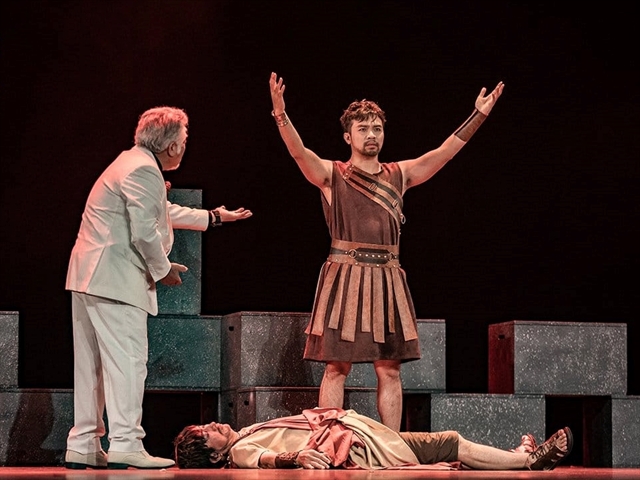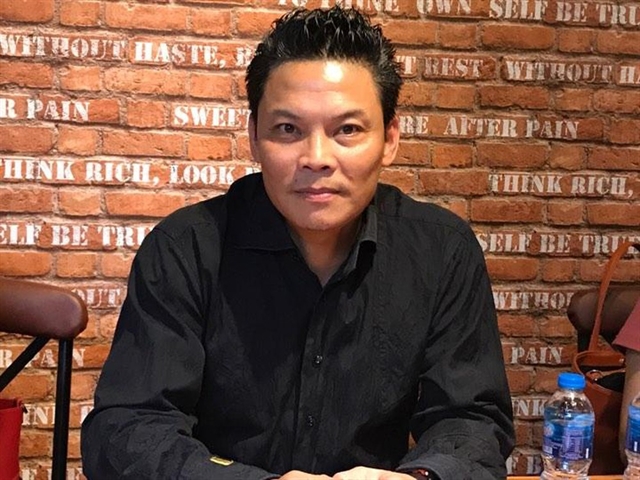 Inner Sanctum
Inner Sanctum

Director Lê Quý Dương proselytises for the online direction of performing arts, even though this form of performance loses the direct vibrancy of theatrical art. He talks to Ngô Minh about his work and the value of online performances.
Director Lê Quý Dương proselytises for the online direction of performing arts, even though this form of performance loses the direct vibrancy of theatrical art. He talks to Ngô Minh about his work and the value of online performances.

|
| A scene in 'Vụ Án Người Đốt Đền' (A Crime of Herostratus), directed by Lê Quý Dương. Photo courtesy of Lệ Ngọc Theatre |
Inner Sanctum: The Vietnamese theatre industry has gone through 100 years of development. Looking back, what are your thoughts on its achievements and limitations?
We can temporarily divide our 100-year-old theatre background into four stages. The first period falls between 1921-1946, marking the dawn of national drama in theatre, which was influenced by classical tragedy and comedy from France.
The second period (1946-1971) marked the shaping of professional Vietnamese theatre art, alongside two resistance wars against France and the US.
The third period (1971-1996) was the peak of Vietnamese theatre, with the second generation of professional directors trained in Stanislavski's psychological realism method in the Soviet Union and other Socialist countries. The fourth period (1996-2021) can be temporarily named the "transformation" of modern Vietnamese theatre.
We can be truly proud of the great achievements that past and present generations have achieved. However, we are facing big challenges as audiences are gradually moving away from the stage, and performing art has been interrupted due to COVID-19.
Inner Sanctum: Out of the six gold medals awarded at the National Drama Festival 2021, there were two plays with historical themes: Làm Vua (Being a King) and Thiên Mệnh (Mandate of Heaven). Do you think this means historical drama is receiving more attention from audiences and critics?
I believe that the two historical plays were also really high-quality theatrical works, meeting the organising board and jury’s criteria.
To me, the topics of traditional history and contemporary reality are equally attractive and valuable. As the director of Being a King, I still tried to bring contemporary issues into the play.
Inner Sanctum: Could you tell us about the challenges in making history attractive to audiences?
The first difficulty is that the artist needs to have a knowledge and understanding of historical traditions so as not to distort the identified values. If you approach historical topics without contemporary creativity and emotions, it can be dry and boring. If you try to change or renew the plot, it is easy to fall into the trap of "distorting history".
As with artists in any art form, when approaching and creating a work with a historical theme, you must very skillfully find a balance between historical events and personal creations and emotions that resonate with the times we live in. It's not right to fall on either side. We must keep the balance and walk carefully on that thin line.
The second difficulty is how to make historical characters and stories, when re-enacted on the stage, convincing and attractive to contemporary audiences in all aspects of the process of enjoying and perceiving the work.
The third difficulty, also the most important and the most challenging one, is how to deliver a message, which is truly valuable to contemporary society and people.
When all these difficulties have been overcome, the work will be appreciated by experts and audiences.
Inner Sanctum: The Ministry of Culture, Sports and Tourism has been conducting an online theatre project to serve audiences amid the pandemic. Are you afraid that the online stage will make audiences lose the habit of going to the theatre when the pandemic is under control?
I fully support the programme of the ministry. Although this form of performance may lose the direct vibrancy of theatrical art, it solves many problems in adapting to the current situation.
First, the online stage creates equal opportunities to enjoy for all audiences, especially those in remote, border and island areas. Everyone is equal and has the right to enjoy and appreciate art.
Second, online theatre will expand and enhance the educational features of theatrical art. Each performance, in addition to being entertainment, will be an aesthetic and humane lesson, contributing to raising intellectual and social consciousness.
Third, the online stage will save on management and operation costs for the theatre and increase revenue for performing artists through selling tickets and advertisements online.
Fourth, the online stage is an opportunity for theatres and art troupes to create more works.
Fifth, the online stage will open a new channel to evaluate the talents of creative and performing artists objectively and transparently based on the number of followers and the direct feedback of critics and audiences.
Finally, the online stage will be an official channel to introduce, exchange and integrate the Vietnamese stage with the world stage in the fastest and most economical way. With this criterion, I suggest that all theatrical plays selected in the online theatre programme of the Ministry of Culture, Sports and Tourism need to have English subtitles or other foreign languages suitable for international showings.

|
| Director Lê Quý Dương believes in the power of online theatre. VNS Photo Ngô Minh |
Inner Sanctum: How should we harmonise live and online performances?
We are living in an era where individuals actively choose what is suitable for their purposes, needs and conditions. The most important thing is to carefully study the ticket prices of live performances at the theatre and the ticket prices of online shows.
Inner Sanctum: Would you tell us about your current projects?
I have directed the drama Vụ Án Người Đốt Đền (Herostratus Who Burned Artemis Temple) based on the original script by Russian playwright Grigori Gorin. In the 1980s, the Việt Nam Drama Theatre produced the piece and it stirred audiences. Now Lệ Ngọc Theatre has invested to make it great again.
Herostratus who burned Artemis Temple of Ephesus became a symbol in literature and art, as a man who commits a criminal act in order to achieve notoriety at any cost.
Gorin’s plot is a literary and dramatic masterpiece, which is considered a piece of heritage. I tried to bring a new breath of modern creativity into the play.
Through the drama, I sent a message that criminals must be punished as always. Punishment for visible and recognisable crimes is easy. Punishment of crimes in disguise, hidden under the masks of kindness and humanity is much more difficult.
The human world today has many types of such crimes. I overturned the problem Gorin posed 50 years ago with newly written dialogue between Herostratus and the Theatre Man.
It is a dialogue of two eras, 25 centuries apart, to clarify hot issues in society today. With the goal of touring nationally and internationally, I have staged a performance with a suitable duration and symbols. The play is extremely compact, but the weight and multidimensional emotions will be fully felt by the audience. VNS




